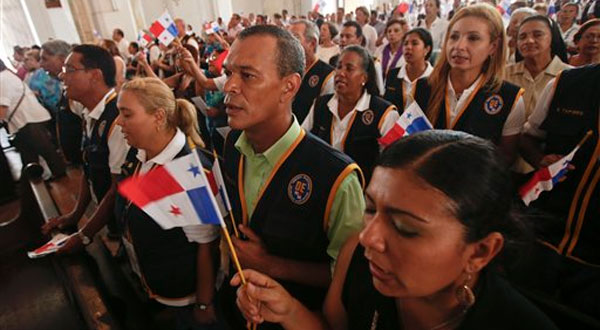Panamanians vote in tight presidential election

Electoral tribunal members hold representations of Panama’s national flag during a Mass at the Metropolitan Cathedral, also attended by presidential candidates, in Panama City, Saturday, May 3, 2014. AP.
PANAMA CITY, Panama—Panamanians are choosing President Ricardo Martinelli’s successor in a three-way dogfight marked more by ugly personality clashes than any deep disagreements over the way forward for Latin America’s standout economy.
Most pre-election polls for Sunday’s contest show the front-runners in or near a technical tie, with a razor-thin lead for Martinelli’s hand-picked candidate, former Housing Minister Jose Domingo Arias. The other main contenders, former Panama City Mayor Juan Carlos Navarro and Vice President Juan Carlos Varela, are duking it out for second place.
Martinelli, a billionaire supermarket magnate, is barred by Panama’s constitution from seeking consecutive re-election, but many fear he’ll be the power behind the throne if voters chose Arias, a soft-spoken newcomer.
As the race narrowed in recent weeks, Martinelli crisscrossed the tiny isthmus inaugurating hospitals, stadiums and Central America’s first subway while warning the 3.2 million Panamanians that record-low unemployment and economic growth averaging over 8 percent since he took office in 2009 could be jeopardized if his enemies are elected.
His use of the bully pulpit has drawn widespread condemnation, as has his decision to place his wife, First Lady Marta Linares, on the Democratic Center ticket as Arias’ running mate. Never since the United States’ 1989 overthrow of military strongman Manuel Noriega has an incumbent party won re-election.
Article continues after this advertisementBut what worries many is the likelihood of a photo finish.
Article continues after this advertisementErasmo Pinilla, president of the Electoral Tribunal, last month warned the election results could be contested, something that’s never happened since democracy was restored following Noriega’s ouster.
“Weakening the referee in the crucial moment of the electoral process marked by highly aggressive language serves no other purpose than to commit fraud,” Pinilla said.
All three campaigns have lobbed vicious attacks against each other.
Navarro has faced unsubstantiated accusations of ties to drug-trafficking and Venezuelan President Nicolas Maduro, who recently severed ties with Panama. Varela has defended himself from leaks to the media that he received payments, including one to buy a yacht, from the daughter of a political ally convicted in the U.S. of money laundering.
In turn, both opponents’ campaigns attack Arias as a puppet of his political mentor, suggesting he’d resign once in office or rewrite the constitution to let Martinelli seek re-election before a two-term cooling off period ends. Martinelli says he’s not interested in retaining power, and Arias says if he’s elected he’ll govern on behalf of all Panamanians, not one party.
While all campaigns punched below the belt, much blame for the filth falls on Martinelli for violating electoral laws that prohibit a sitting president from actively campaigning, said Maribel Jaen, director of the Peace and Justice Commission.
“Never have we had a president who so overtly favored a candidate,” said Jaen, who with former U.S. President Jimmy Carter and the Roman Catholic Church sponsored an ethics pact signed by all seven candidates.
The mudslinging belies a pro-business consensus among the front-runners, who all came of age during democracy and hail from the European-descended, foreign-educated elite. Although Panamanians criticize what they view as Martinelli’s authoritarian bent, 60 percent of them approve of his performance and acknowledge his legacy of infrastructure improvements, including work on a $5.2 billion canal expansion.
Navarro, 52, was Panama City’s mayor for 10 years until 2009 and is a businessman who also started the nation’s leading environmental nonprofit. Under his leadership, the Democratic Revolutionary Party has moved to the center-left and distanced itself from its past links to the former military regime.
Varela, a 50-year-old engineer, is the scion of one of Panama’s richest families, owner of a namesake rum distillery. He left the 2009 presidential race to throw his conservative Panamenista party’s support behind Martinelli in exchange for the vice presidency. But Martinelli dismissed him as foreign minister in 2011 for refusing to back his plan for a referendum seeking consecutive re-election. Varela’s since become the president’s fiercest critic, accusing him of taking kickbacks for a government radar system contract. Martinelli denies the charges.
Arias, who’s never run for office before, has a business background in the textile industry. He joined Martnelli’s government as deputy trade minister and became housing minister in 2011.
RELATED STORIES
Venezuela expels Panama ambassador, three others
Panama finds explosives on North Korea-bound ship